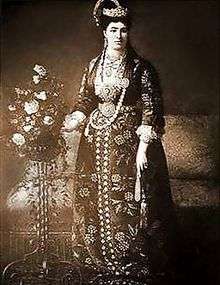Jeshm Afet Hanim
Jeshm Afet Hanim (Arabic: جشم آفت هانم; Turkish: Çeşm İfet Hanım; died 11 November 1907) was the Princess consort of Khedive Isma'il Pasha of Egypt. She was the adoptive mother of the future Sultana of Egypt Melek Tourhan.
| Jeshm Afet Hanim | |
|---|---|
 | |
| Died | 11 November 1907 Egypt |
| Burial | |
| Spouse | Isma'il Pasha |
| Issue | Melek Tourhan (adoptive) |
| House | House of Muhammad Ali (by marriage) |
| Religion | Sunni Islam |
Marriage
Isma'il Pasha married Jeshm Afet Hanim, and elevated her to the position of the "Third Princess".[1] Al-Tahtawi’s book on the education of women, titled al-Murshid al-Amin lil Banat wa al-Banin (the faithful guide for girls and boys) published in 1873, was commissioned by Khedive Ismail after Jeshm Afet Hanim, used her own money to establish the first general public school for girls at al-Suyufiya in 1873, which claimed additional fame to her.[2]

The genealogy of the dynasty revealed that Jeshm Afet had no children of her own, [3] which might explain her interest in the education of young girls. Hasan Tourhan Pasha, a captain in the Ottoman Navy offered an adoption of his daughter Melek, in order to improve her lot in life. Melek was adopted by Jeshm Afet, during the 1870s. While they lost touch with each other following the exile of Khedive Ismail, when Melek Hanim became the second wife of Prince Husein Kamel in 1887 returning to Egypt with him, she resumed her acquaintance and a relationship with Aisha Taymur. There was no doubt that the relationship between Jeshm Afet Hanim and Taymur was shaped by their mutual interest in women's education and poetry that reflected the changing interests and concerns of some royal and upper-class women beyond mothering and feminine crafts.[2]
Death
Jeshm Afet Hanim died on 11 November 1907,[4] and was buried at the Khedival Mausoleum, Al-Rifa'i Mosque, Cairo, Egypt.[5]
References
- Beshara Doumani (February 1, 2012). Family History in the Middle East: Household, Property, and Gender. SUNY Press. p. 258. ISBN 978-0-7914-8707-5.
- Mervat F. Hatem (12 April 2011). Literature, Gender, and Nation-Building in Nineteenth-Century Egypt: The Life and Works of `A'isha Taymur. Palgrave Macmillan. pp. 2, 198. ISBN 978-0-230-11860-7.
- Hassan, Hassan (2000). In the House of Muhammad Ali: A Family Album, 1805–1952. American University in Cairo Press. ISBN 978-977-424-554-1. OCLC 45016821.
- http://www.geocities.ws/hazemsakr/royal/ismail.html His Highness Hidiv Ismail Paşa Hidiv of Misir (Egypt), Sudan and Taşoz
- http://amorbidfascination.blogspot.com/2010/05/royal-tombs-rifai-mosque-cairo-egypt.html Royal Tombs, Rifa'i Mosque, Cairo, Egypt
External links
| Wikimedia Commons has media related to Consorts of the Muhammad Ali Dynasty. |
- Soszynski, Henry. "HH Khedive Ismail I Pasha". Ancestry.com, Inc. Retrieved 2010-02-27.